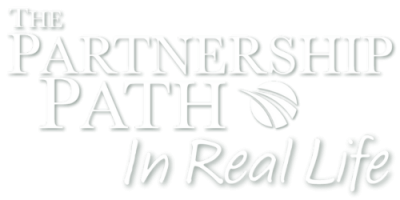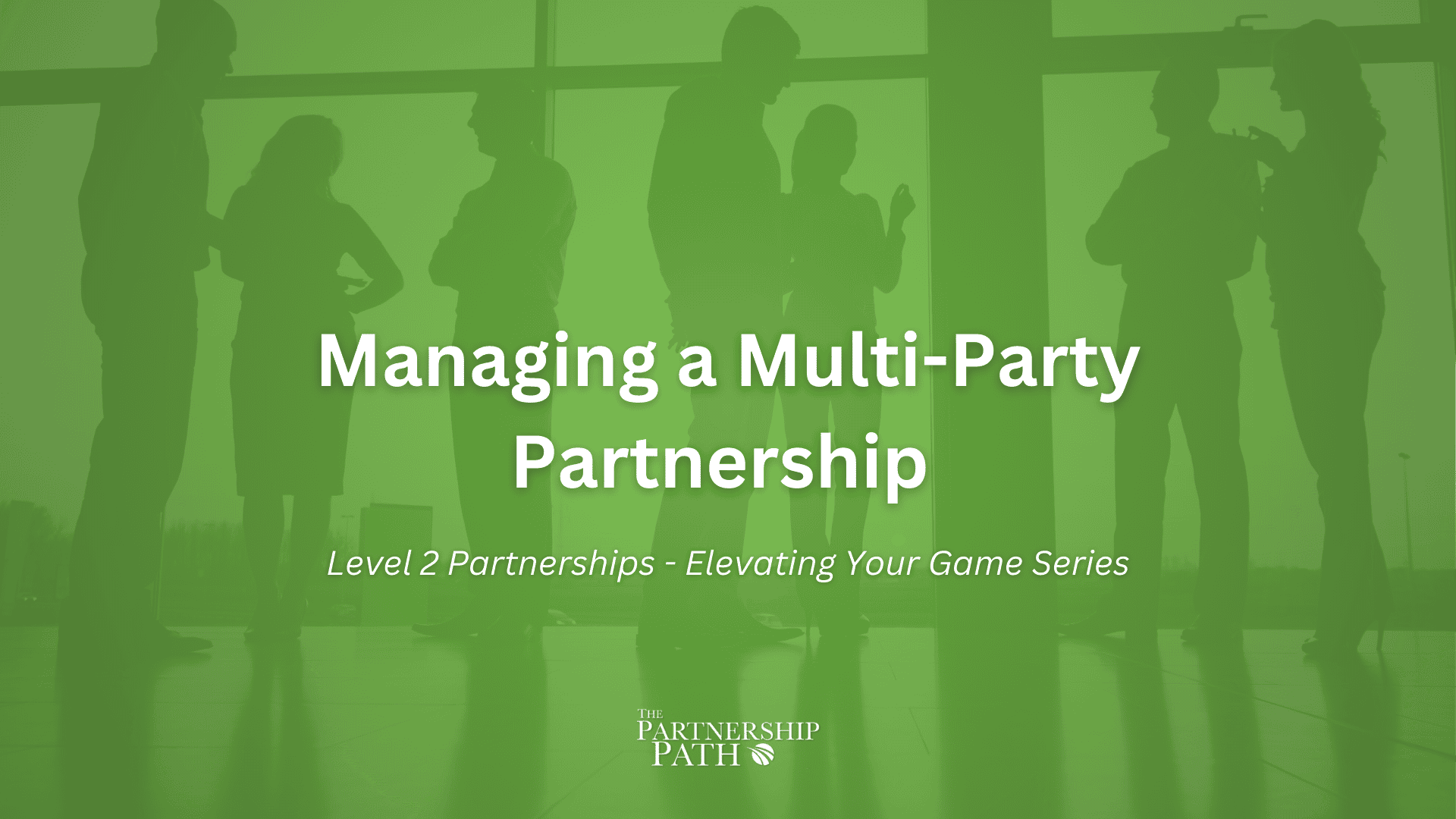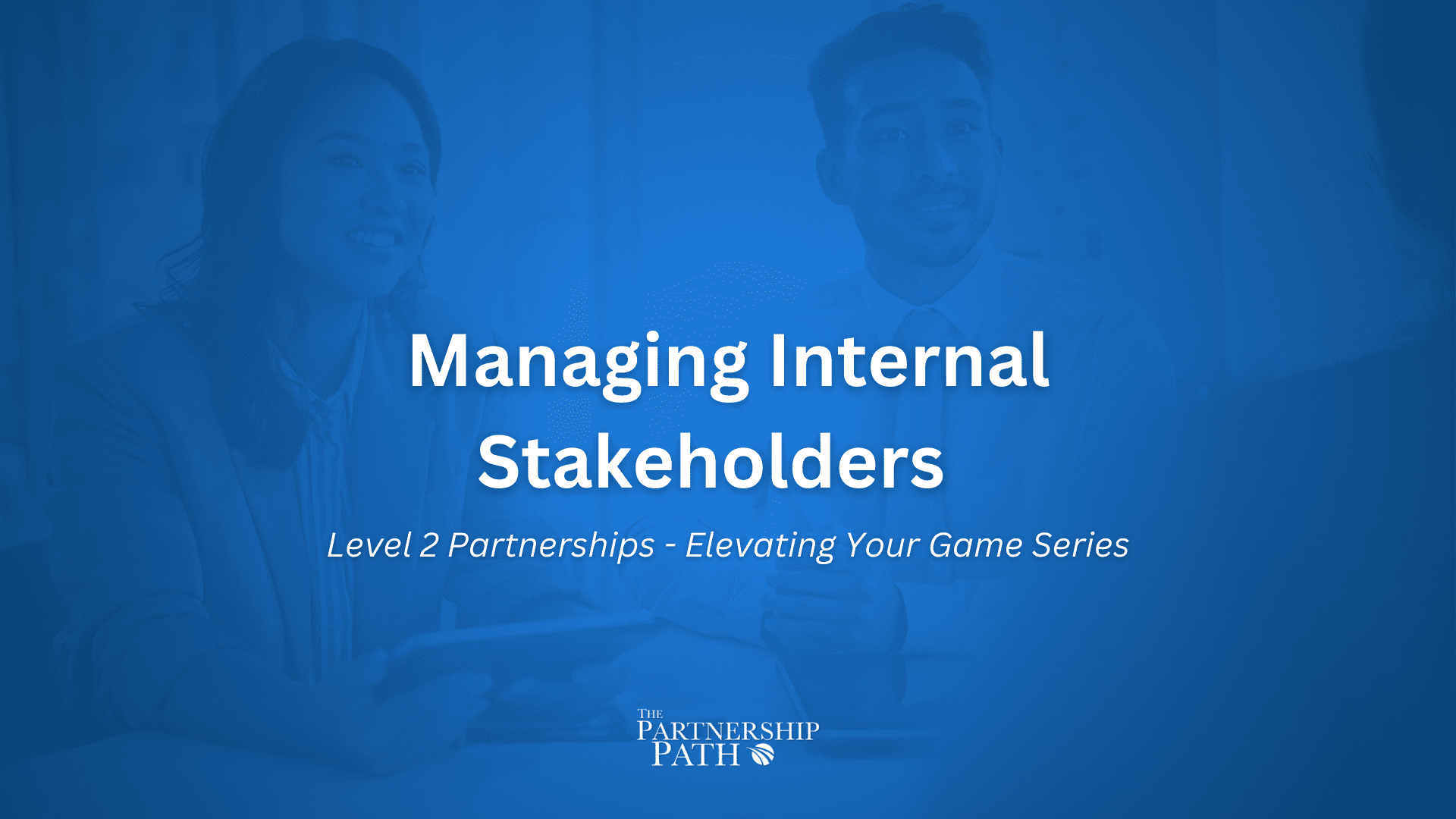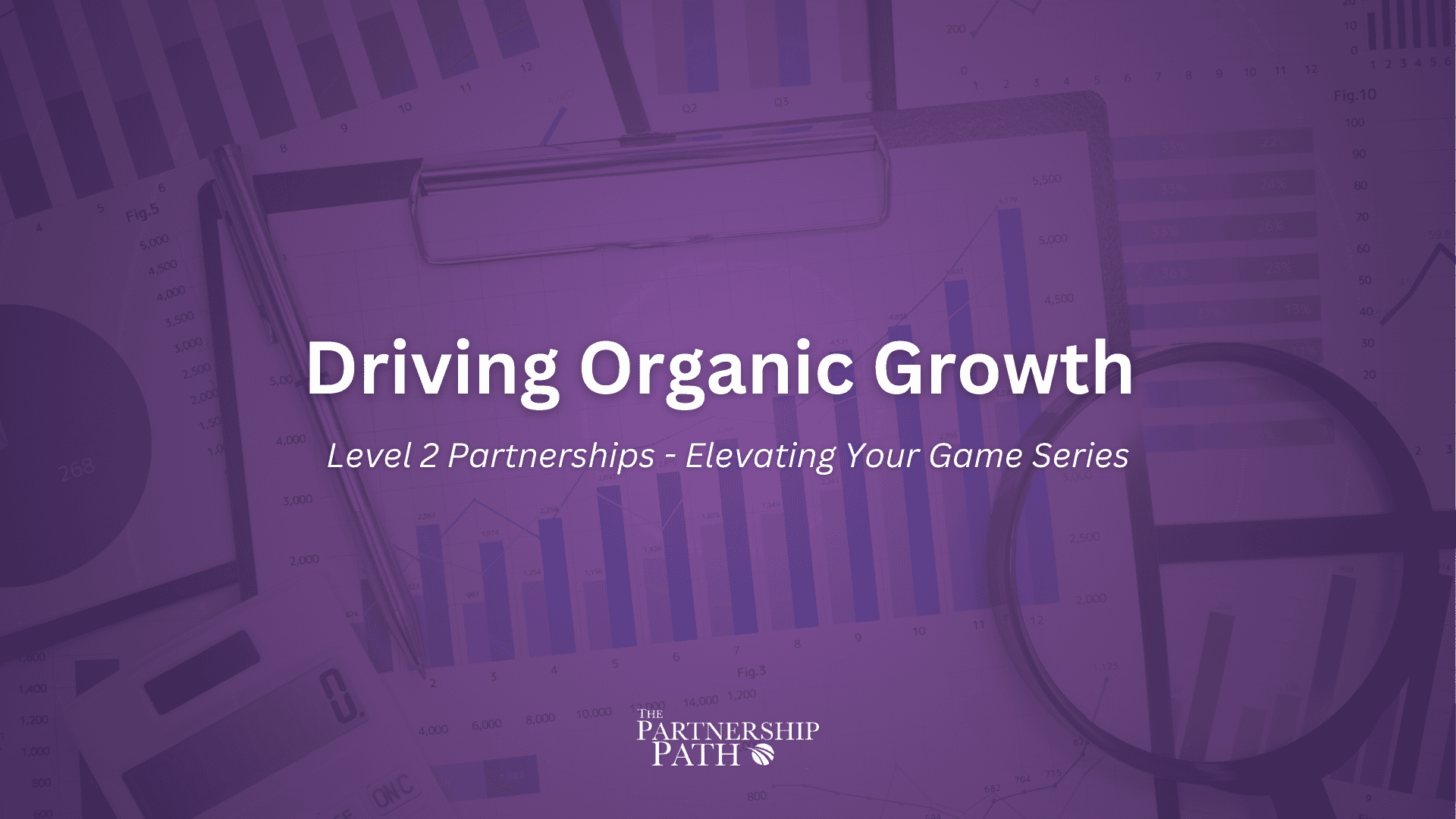Jenn Martin at Microsoft on Co-Selling to Seal the Deal
Episode Summary
Jenn Martin, a seasoned sales leader with over a decade in tech, shares her unique insights on co-selling, especially within cloud ecosystems like Microsoft’s. Through her conversation with host John Rudow, she explores the evolving landscape of co-selling and how companies can better align with large platforms to scale their businesses. Whether you’re an ISV (Independent Software Vendor) or a service partner, this podcast episode offers a deep dive into the practicalities and nuances of co-selling.
Transcript
John (00:00)
Well, Jenn, welcome to the Partnership Path in Real Life podcast. I’m so happy to have you on the podcast with us today. Anxious to hear your thoughts on Co-Selling as we get into that. But before we do that, I want to give you a chance to introduce yourself to our listeners. So tell us a little bit about your background and how long you’ve been working with partners.
Jenn (00:20)
Absolutely. Thanks for having me for sure. So I have been at Microsoft for five years. I am a PDM in the Americas organization looking after some of our modern workplace and industry ISVs. Prior to my journey at Microsoft, I spent five years at an ISV in the Microsoft ecosystem in sales leadership, running Alliance organizations and direct sales organizations. And I…
John (00:45)
Yeah.
Jenn (00:46)
I end the Microsoft relationship and I do joke that I did the job backwards. I think I would have been way better at that job if I’d spent a little bit of time inside Microsoft. But I do bring with me a little bit of that empathy of trying to navigate. I also managed our channel program. So.
navigating Co -Sale with channel partners, navigating Co -Sale with Microsoft, navigating the general relationship with Microsoft, all while being responsible for a number, right? Like all the different crooked paths that we can take to get to the number. For that little known fact, John, I worked in ESPN and sports. So I didn’t spend all my time, I did. I was in sponsorship sales. That was like my fresh out of college and then for the next,
John (01:21)
Yeah, that’s right.
You did not.
Jenn (01:39)
Well, I don’t want to date myself here. People start adding up some numbers here. But a long time ago. So I didn’t spend all my career in tech, but the last 10 years I’ve been in tech.
John (01:50)
that’s cool though. I didn’t know that. That’s a really fun fact and a little known fact. Yeah. No. But you know what? I think that’s, to be honest with you, I love that only because I don’t think there is a normal path, right? I mean, you know, and people shouldn’t feel like just because they started in one place, they can’t get to another, right? We live in this great economy, great world where you can do that kind of stuff. So I think that’s really cool. Thanks for being an example of that.
Jenn (01:55)
It’s not the normal path, that’s for sure.
Yeah.
Yup. Yup.
John (02:20)
All right, well, listen, this episode, what I wanted to have you on the show about it, and it’s partly because of your background, because you’ve seen it from both sides and you’ve seen different kinds of Co -Sell and stuff. You just listened to this episode last week that Tony and I did on this concept of Co -Sell. And, you know, I’d love to just start there. Tell me, listening to that, you know, what resonated for you, what stood out for you? You know, what did that episode make you think?
Jenn (02:50)
Yeah, it was a great episode. I really enjoyed listening to it. But it did make me think that we’re, and so I’m going to come from like a very Microsoft perspective in this answer, right? And like, the co -selling with Microsoft perspective. Which I don’t think that episode you did with Tony, which was great and focused on co -selling with channel partners, with services partners, with resellers.
John (03:02)
Sure, yeah.
Jenn (03:18)
But I think the way you look at co -selling with these cloud ecosystems, it almost is like we need a different word because it isn’t co -selling in the same way that you would approach it. It’s not the same strategy. It’s not the same approach. And I think the way that you measure it and the expectations and the impact that it could have for your business are very different as well. So.
John (03:27)
Yeah.
Jenn (03:47)
I mean, I guess one of my big takeaways from that episode is just a reminder, and I’ll also address this from very ISV specific lens, right? That’s my experience, but you have to have different strategies, right? You have your channel strategy and co -selling with and through channel. And then you have your ecosystem strategy, which is, it’s the same word, but totally different.
John (03:58)
Of course, of course, yeah.
So let’s dig into that, right? I mean, we have plenty of people that are listening who work for those outside ISVs who don’t work for Microsoft, who hear that word, CoSell, and may have experienced in it a particular way. So tell them, without the word, if we don’t have a word for it, what do you mean by that? How is it different?
Jenn (04:34)
Yeah. Yeah. I, what I really liked about your episode with Tony is you were trying to unlock this magical thing around scale, right? How does co -selling build scale? Like everybody’s trying to unlock scale. And I think that if we think about, if we define scale as like helping you win more of your deals, right? Like more stuff comes through the funnel. You can build scale that way or.
John (04:43)
Yeah. Yeah.
Yep. Yep.
Jenn (05:02)
helping those deals close faster, you can build scale that way. I think that some people when they hear scale, they think like, maybe, because when I was a sales leader, I heard this like magical money from nowhere, right? Like deals, they just show up on your bottom line.
John (05:18)
no, I hope that’s not what people think. It’s certainly not what I meant, but yeah, okay. Yeah.
Jenn (05:22)
Right. But you know, like, scale is like this magical thing. And I think that doing COSO with a cloud ecosystem, you can build scale if you think of it as an extension or an acceleration of your direct sales motion. Right? So I think that if you go into your relationship, and I think what I say with Microsoft, you can repeat with GCP or IBM or Adobe, whatever. Right? And you think of how do I leverage and build this relationship?
John (05:36)
Yeah. Okay. Yep.
Sure. Yeah.
Jenn (05:52)
in a way that is going to help me accelerate my deals. And like a extra credit bonus thing that comes out of there is that Microsoft thinks about me when I’m not in the room anymore. And they bring me into things that I wasn’t aware of. I think sometimes some ISVs come into the relationship with Microsoft in an inverse, right? They think,
John (06:06)
Right?
Jenn (06:18)
I just tell them about my product because they’re approaching it from a reseller mentality. I need to enable you. I need to just make sure you understand what I do and then you’re gonna sell for me. You’re gonna resell my product. And it’s not, it’s doomed. It’s doomed for failure because that’s not how our Microsoft field works with our ISV partners, right? But that scale and acceleration,
John (06:24)
Right, right. Right, right.
Right.
Yeah. Yeah.
Right, right.
Jenn (06:46)
is there and that value, right? So now I’m gonna keep going, John, just like, okay, give me a sign if I’m going too far off of untangible here. But like, if you approach your Microsoft relationship and you think maybe even like on this deal specific thing, like how can Microsoft help me be more likely to close this deal or close it faster?
John (06:53)
Do it, do it, I’m loving it, yeah.
No, no, this is all good.
Right? Yep.
Jenn (07:13)
Right? Like what are the specifics that Microsoft could add to this? And then you approach it in that deal centric approach. You will harvest value from co -selling with Microsoft.
John (07:26)
So, but what does that look like? So when you say that, like what are the ways that Microsoft or any hyper scaler or large, you know, aggregator like that can, how can they help me as an ISV close that deal faster? Like what do they really bring to the table?
Jenn (07:41)
Yeah. Yeah. That, unfortunately, isn’t like a menu that applies to every partner, right? I do wish it was. But there are some general themes that I found to be consistent with. I’ve worked with a lot of different types of partners over my five years here. And one of the things that I think these hyperscalers can give, especially for some of these less mature,
John (07:49)
Right. Yeah. Yeah.
Jenn (08:11)
ISVs that don’t have brand names that everybody knows about, they’re selling into these large enterprises, is the kind of social proof or validity, right? But when you come in with Microsoft, you get the umbrella of the brand halo that comes along with that, right? So I think that validity is really valuable.
John (08:14)
Right? Yep.
Right. Yep.
Yep, that’s right. Right. Yep. Okay.
Jenn (08:36)
I think the other bucket where I’ve seen Microsoft help move a deal along is in the introductions, right? Like, hey, I’m working here. Well, this kind of is like two parts. I’m working here. I want to, I think I want to be working here in this other organization, but I don’t have a connection to that person. Now, sometimes Microsoft does and…
John (08:44)
Mm -hmm. Right.
Jenn (09:01)
As long as you’re aligning, you know, you’ve had a good story and you’ve aligned to the scorecard and all the other like have to do’s, there’s often willingness to bring you there, right? But sometimes you may think you need to be there, but there’s this insight that the Microsoft account team can provide that actually might change your entire strategy of how you’re selling to this organization. And I had a really specific example of this with,
John (09:06)
Right?
Yeah. Yeah.
Jenn (09:31)
a large manufacturing customer. And it was an ISV that I worked with that this was a very important, a very important customer, and it was a renewal, a long -standing customer. And they were sort of aligning for AlignmentSync. They actually didn’t think there was going to be a lot of value. And the Microsoft account team, the ISV is talking about who they know and their plans and this org. And the Microsoft account team said, do you know that he’s retiring?
John (09:41)
Okay.
Jenn (10:00)
He’s retiring in two months. And what I think is this entire team is going to be absorbed over in this other organization. And ISV realizes they did not know that, and they have no connections in that other organization. So I think that insight of both these companies are in selling maybe similar or different things to the customer, and they’re all getting different.
John (10:17)
Yeah. Yeah.
Jenn (10:30)
pieces of information, right? But working together, you can kind of stitch that into a comprehensive story. So it’s like validity, insight, and introductions, I think, are the three. And then you have like, on that same insight, sometimes for certain ISVs, it helps to understand the technology that a customer is using, like their adoption of certain things, their journey, their maturity journey. There’s a lot of insight.
John (10:31)
Sure, that’s right, that’s right.
Jenn (10:58)
and come from somebody who’s working so close with their infrastructure and other things.
John (11:03)
Yeah. You, so two things I want to, I want to follow up there. One, you know, there’s this whole new, solution industry stuff going on in the market right now of actually automating a bunch of that where, right. Software companies can sign up into a community type of offering where it overlaps. It takes all of your.
Jenn (11:22)
Yeah.
John (11:32)
target profile customers and their target profile customers and existing customers and says, here’s where there’s overlap. Now, how much of that do you want to share with the people that you’re connected to? Right. And so there’s this it’s a it’s a growing piece of work to drive this ecosystem, Co -sell concept. Right. So that was number one. I just I’m not sure it was a little bit new to me as I started looking deeper into the Co -sell. How much of that’s really going on out there right now?
Second thing is, I wanted to ask you, you said early on you would have been better at your job in the smaller ISV had you spent a little bit of time in Microsoft first. So, you know, for our audience, what would, what’s your advice to them? Like, what would you have done differently in terms of trying to leverage CoSale with a hyperscaler like Microsoft? You know, in hindsight, so, you know, what would you share with those people now that you would do differently?
Jenn (12:32)
Yeah, great questions. I’ll do the first one first. And these like kind of like matchmaking account mapping sort of software. I think it’s great. I don’t think it’s a magic bullet. And there’s a couple of reasons for that. One is that I think that ISVs, and this maybe is also part of number two, are not very good at articulating their ideal customer profile.
John (12:38)
Yeah. Yeah.
No, for sure not. Right.
for sure. Especially less mature ones, right? Because they want to sell to anybody, right? Anyone who’s… Yeah, even the mature ones. Yeah. No one wants to say no, right? Yeah.
Jenn (13:03)
And they’ll say things.
No, even mature ones. I think it’s universal, right? Yeah. And it’s like, we sell into, and then they will put it in Microsoft terms, we sell into strategic customers, right? Or, you know, the S 500 or whatever the term de jour is, enterprise. And, but what I found is that, and you don’t have to be a verticalized solution.
John (13:23)
Yeah, yeah, yeah, yeah.
Jenn (13:37)
Right? Horizontal solutions, there’s a lot of opportunity to really define your customer even in a horizontal solution. You know, it’s like customers that it needs to be a quantum for these systems to work. It has to be a quantitative measurement that could, you could put it in a spreadsheet, right? And so I think until you can clearly answer that yourself as an ISV in a spreadsheet way.
John (13:38)
Right, right.
Right, yeah.
Jenn (14:07)
those are not going to be successful. But I think there is a lot of opportunity there, especially for those that sell into mid -market and SMB, where this really direct, I think you refer to it as shoulder -to -shoulder selling, it’s not possible. You can’t do that. That’s not how you can sales to the customer. So yeah, I think there’s a lot of opportunity there. So on the second part, it’s really interesting because there’s so much.
John (14:08)
Yeah. Yeah. Yeah.
Yeah, yeah, right. That’s right. It’s not scalable at all. Yeah.
Jenn (14:37)
I think that the number one thing I would have changed is actually what we started this conversation with is I thought I just need to play, and this was a little bit before Co -Cell was like a really a thing, but programmatically, I thought the magical rainbow or the pot of gold of
Microsoft building scale through Microsoft where the Microsoft field is going to sell my product for me was just one more of a knowing thing I had to do as a partner away. Right? Like I just needed to share more pipeline. I needed to do one more call. We needed to, you know, sponsor one more thing or, you know, get one more certification or, you know, there’s a lot like cranking on the wheel with misaligned expectations of
John (15:18)
Mm. Yep.
Jenn (15:36)
what the outcome was going to be. And I think as a result, I wasn’t looking for the little wins along the way to articulate, understand, and repeat. Right? Because it was like there was some nirvana that was going to happen. And there is no nirvana. It’s the process itself that is the value. Right? So I think being really clear, and I would have structured.
John (15:50)
Right. Yep.
Yep. Right, right.
Jenn (16:05)
I would have measured and compensated my team differently. Because a lot of it was based on outbound opportunity coming from Microsoft, right? The way that they hit their numbers, my Alliance managers hit their numbers is when they were like, you know, 7%, 17%, 1 % of our pipeline was sourced by Microsoft. And I think that’s a very common way of managing an Alliance organization.
John (16:08)
Mmm.
Right, right.
Yeah, sure.
Jenn (16:35)
But I think I would have thought more creatively about impact and like aligning Microsoft to a deal and then doing really deep analytics on like, is it closing faster? Is it closing for more? You know, all these different things. Is it moving from this stage to that stage faster, right? Like, because that’s…
John (16:57)
So less about whether it was coming from them, more about where they were, is their influence actually having an impact? Yeah, okay.
Jenn (17:04)
Yeah, yeah, yeah, and I think the other thing that I advise my partners that I would have done differently is as a sales leader, you sort of gravitate towards other sales leaders and like the people that manage accounts and customers. And I do think that’s where you should spend, that’s the number one, where you should spend most of your time, probably for most partners.
John (17:22)
Yeah. Right.
Jenn (17:31)
But I think that there is a lot of other opportunity with other organizations within Microsoft. And there are a lot. So it’s a long laundry list, and it’s going to be really individualized for each partner and what they do. But the folks that are creating the sales plays or aligning in the sales enablement or the one to many opportunities or the direct to customer sort of opportunities, right? The like,
John (17:39)
Hmm.
Yeah.
Yeah, yeah.
Jenn (18:00)
joint blog posts and the announcements and the much more of like our brands are linked together outside of a deal sort of perspective. I probably would have invested more in those relationships proactively.
John (18:09)
Right.
So that kind of goes back to your first point a little bit, right? Which is being a lot more honest, transparent, clear on what the real value of the relationship is. Like where can we actually help each other? And then to your second point of, you know, actually engaging in the right places and taking advantage of whatever makes sense based on that transparency of.
Jenn (18:28)
Yeah.
Yeah. Yeah. I hope I’m in no way diminishing COCEL because I think it is a really, you know, it’s different.
John (18:42)
of what’s available, right? Yeah, that’s cool.
No, no, no. Look, I don’t think the audience will take it that way, right? I think this is super helpful that, look, the hyperscalers represent a really different entity, right? I mean, it’s a different type of thing that you have to learn how to do. I mean, for crying out loud, there’s tons of consultants and organizations out there that build their entire business just on one hyperscaler, how to interact with one hyperscaler, right? And…
Jenn (19:12)
Yeah. Yeah.
John (19:14)
So it’s clear that there are some nuances to how that really works. So Super super helpful. So so Jen we try and keep these relatively short. We’re at time So I’m gonna I’m gonna stop us there. But thank you. Thank you so much for coming on the podcast I love hearing from you and just you’re so articulate you really I love your background so you can really make it resonate for the people that are listening So thank you so much, and I hope we can have you back again sometime
Jenn (19:41)
For sure, it’s fun.
John (19:44)
All right, I will. Thanks, Jen.
Jenn (19:45)
All right, see you soon. See you, Tom.
Key Takeaways
- Co-selling strategies differ between ecosystems and channels: Co-selling with a large cloud provider like Microsoft requires different strategies from traditional channel co-selling.
- The importance of relationships: Building meaningful, long-term relationships within Microsoft can lead to introductions, insights, and credibility that accelerate deal closures.
- Leverage the brand halo: Partnering with a big name like Microsoft can offer social proof and credibility, especially for smaller ISVs looking to break into enterprise markets.



